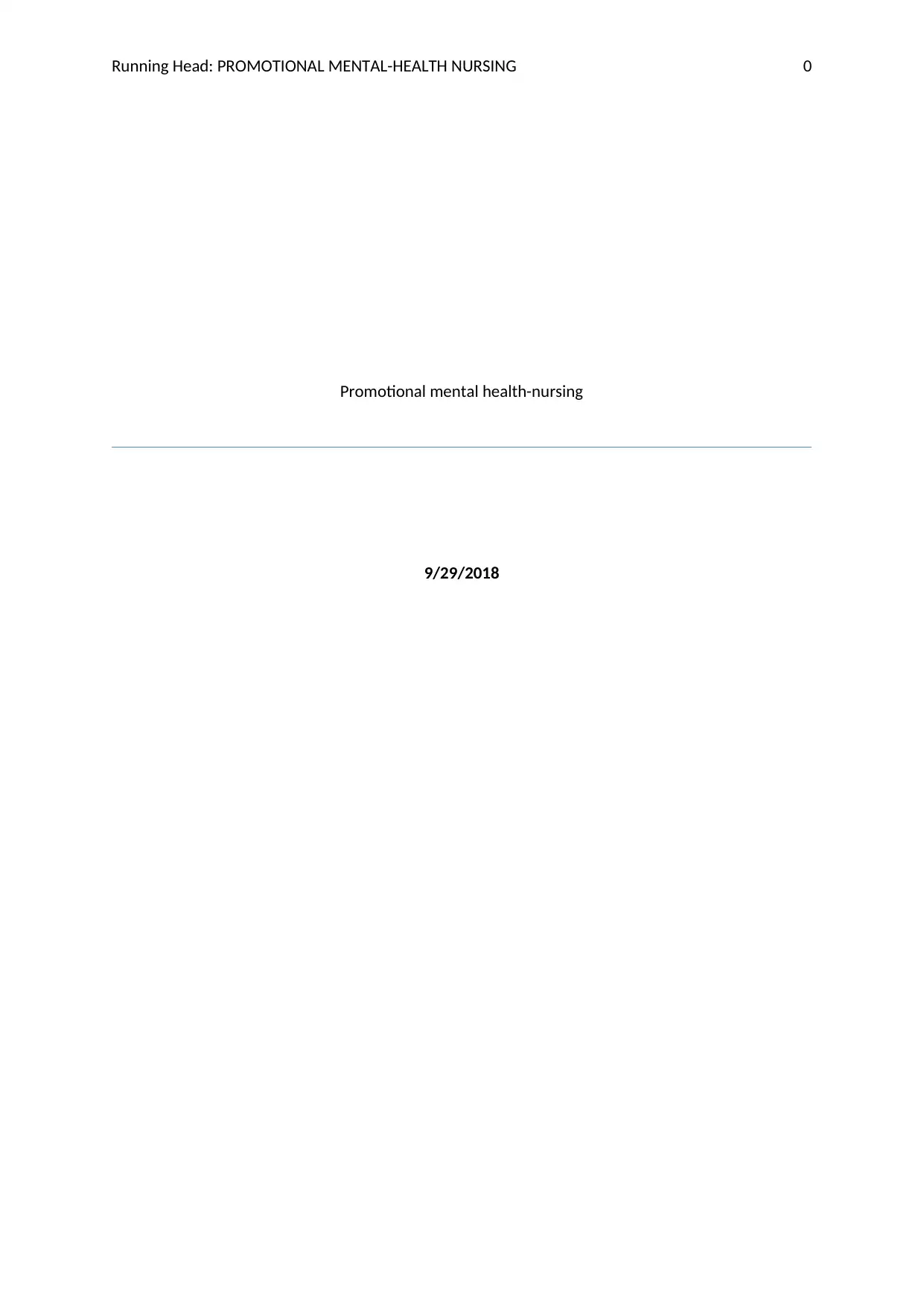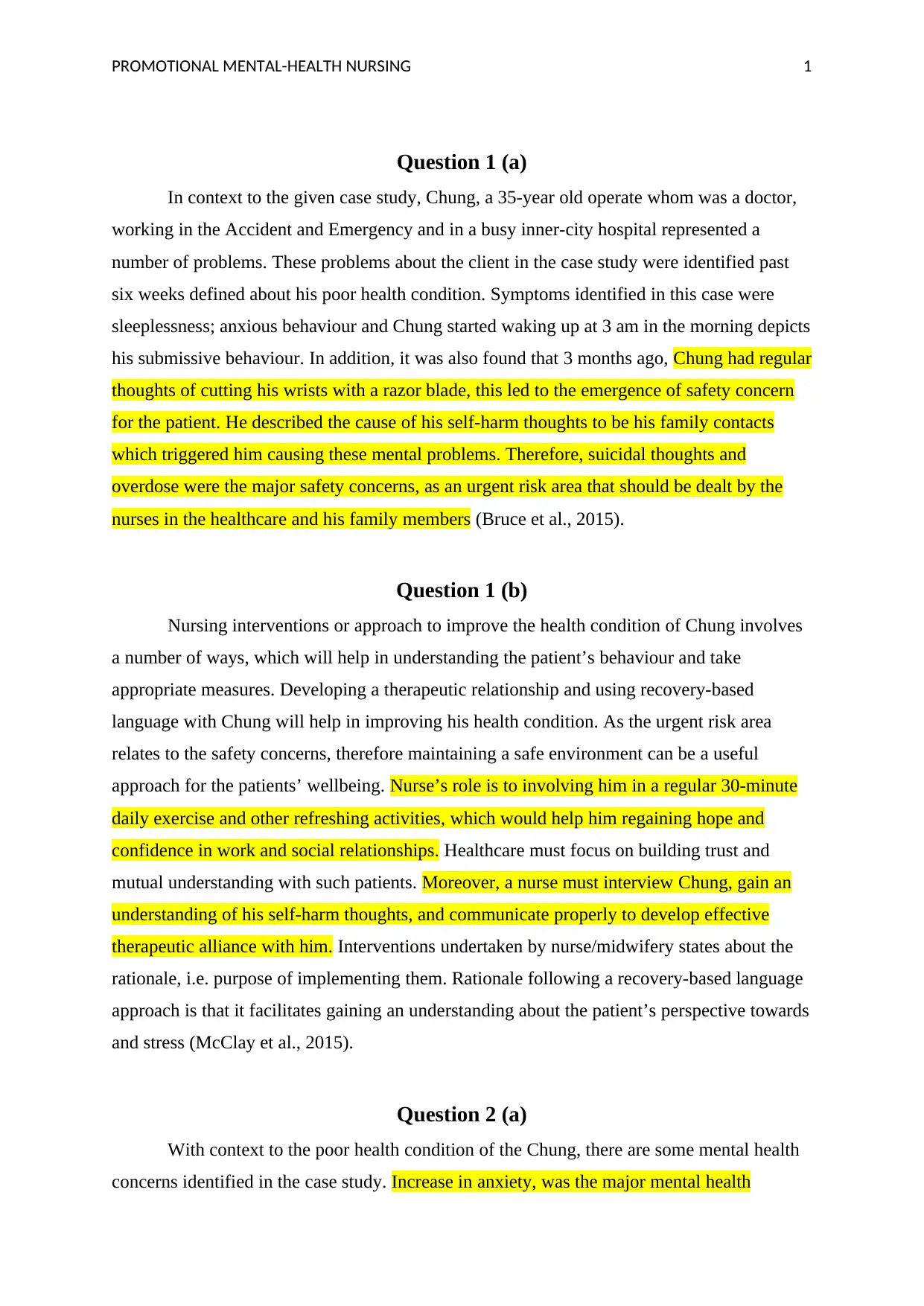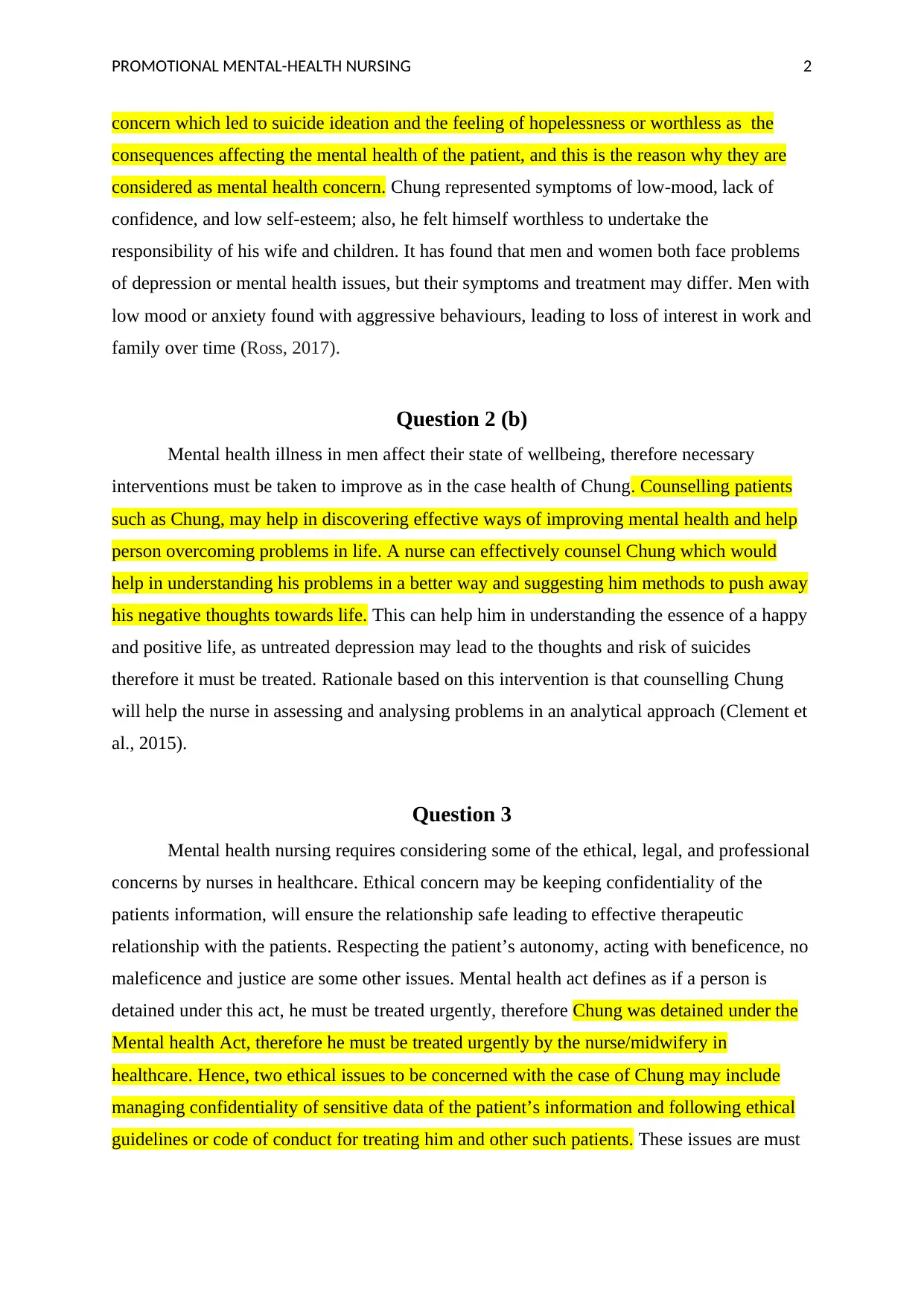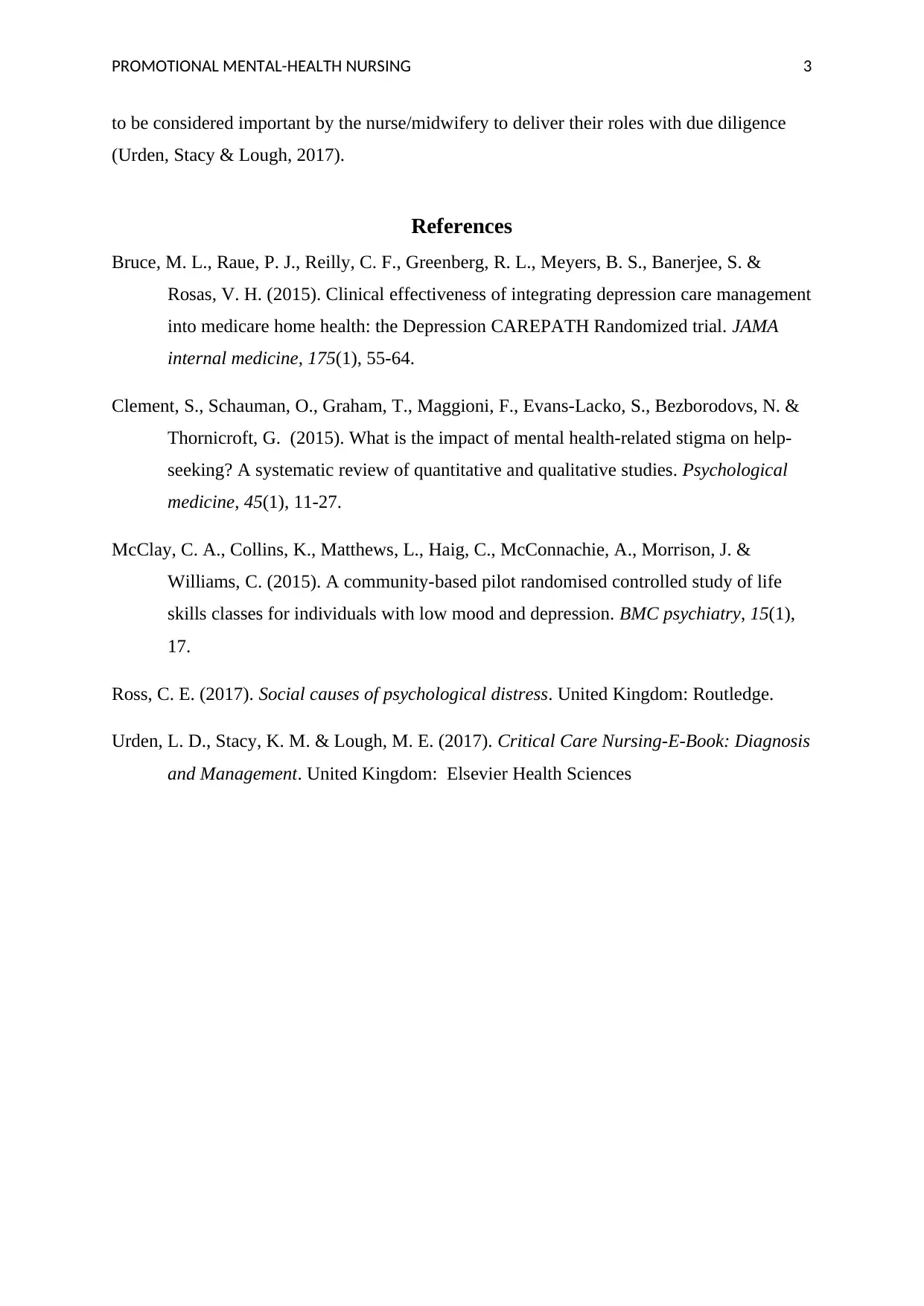Promotional Mental-Health Nursing: A Comprehensive Case Study
VerifiedAdded on 2023/06/04
|4
|1136
|441
Case Study
AI Summary
This case study examines the case of Chung, a 35-year-old doctor experiencing symptoms of sleeplessness, anxiety, and suicidal thoughts. It identifies safety concerns, including suicidal ideation and overdose risks, and proposes nursing interventions such as developing a therapeutic relationship, maintaining a safe environment, and encouraging regular exercise. The study also addresses mental health concerns like increased anxiety and feelings of hopelessness, suggesting counseling as a method to improve mental health. Furthermore, it highlights ethical, legal, and professional considerations in mental health nursing, including patient confidentiality and adherence to the Mental Health Act. The case emphasizes the importance of a holistic approach to patient care in mental health nursing.

Running Head: PROMOTIONAL MENTAL-HEALTH NURSING 0
Promotional mental health-nursing
9/29/2018
Promotional mental health-nursing
9/29/2018
Paraphrase This Document
Need a fresh take? Get an instant paraphrase of this document with our AI Paraphraser

PROMOTIONAL MENTAL-HEALTH NURSING 1
Question 1 (a)
In context to the given case study, Chung, a 35-year old operate whom was a doctor,
working in the Accident and Emergency and in a busy inner-city hospital represented a
number of problems. These problems about the client in the case study were identified past
six weeks defined about his poor health condition. Symptoms identified in this case were
sleeplessness; anxious behaviour and Chung started waking up at 3 am in the morning depicts
his submissive behaviour. In addition, it was also found that 3 months ago, Chung had regular
thoughts of cutting his wrists with a razor blade, this led to the emergence of safety concern
for the patient. He described the cause of his self-harm thoughts to be his family contacts
which triggered him causing these mental problems. Therefore, suicidal thoughts and
overdose were the major safety concerns, as an urgent risk area that should be dealt by the
nurses in the healthcare and his family members (Bruce et al., 2015).
Question 1 (b)
Nursing interventions or approach to improve the health condition of Chung involves
a number of ways, which will help in understanding the patient’s behaviour and take
appropriate measures. Developing a therapeutic relationship and using recovery-based
language with Chung will help in improving his health condition. As the urgent risk area
relates to the safety concerns, therefore maintaining a safe environment can be a useful
approach for the patients’ wellbeing. Nurse’s role is to involving him in a regular 30-minute
daily exercise and other refreshing activities, which would help him regaining hope and
confidence in work and social relationships. Healthcare must focus on building trust and
mutual understanding with such patients. Moreover, a nurse must interview Chung, gain an
understanding of his self-harm thoughts, and communicate properly to develop effective
therapeutic alliance with him. Interventions undertaken by nurse/midwifery states about the
rationale, i.e. purpose of implementing them. Rationale following a recovery-based language
approach is that it facilitates gaining an understanding about the patient’s perspective towards
and stress (McClay et al., 2015).
Question 2 (a)
With context to the poor health condition of the Chung, there are some mental health
concerns identified in the case study. Increase in anxiety, was the major mental health
Question 1 (a)
In context to the given case study, Chung, a 35-year old operate whom was a doctor,
working in the Accident and Emergency and in a busy inner-city hospital represented a
number of problems. These problems about the client in the case study were identified past
six weeks defined about his poor health condition. Symptoms identified in this case were
sleeplessness; anxious behaviour and Chung started waking up at 3 am in the morning depicts
his submissive behaviour. In addition, it was also found that 3 months ago, Chung had regular
thoughts of cutting his wrists with a razor blade, this led to the emergence of safety concern
for the patient. He described the cause of his self-harm thoughts to be his family contacts
which triggered him causing these mental problems. Therefore, suicidal thoughts and
overdose were the major safety concerns, as an urgent risk area that should be dealt by the
nurses in the healthcare and his family members (Bruce et al., 2015).
Question 1 (b)
Nursing interventions or approach to improve the health condition of Chung involves
a number of ways, which will help in understanding the patient’s behaviour and take
appropriate measures. Developing a therapeutic relationship and using recovery-based
language with Chung will help in improving his health condition. As the urgent risk area
relates to the safety concerns, therefore maintaining a safe environment can be a useful
approach for the patients’ wellbeing. Nurse’s role is to involving him in a regular 30-minute
daily exercise and other refreshing activities, which would help him regaining hope and
confidence in work and social relationships. Healthcare must focus on building trust and
mutual understanding with such patients. Moreover, a nurse must interview Chung, gain an
understanding of his self-harm thoughts, and communicate properly to develop effective
therapeutic alliance with him. Interventions undertaken by nurse/midwifery states about the
rationale, i.e. purpose of implementing them. Rationale following a recovery-based language
approach is that it facilitates gaining an understanding about the patient’s perspective towards
and stress (McClay et al., 2015).
Question 2 (a)
With context to the poor health condition of the Chung, there are some mental health
concerns identified in the case study. Increase in anxiety, was the major mental health

PROMOTIONAL MENTAL-HEALTH NURSING 2
concern which led to suicide ideation and the feeling of hopelessness or worthless as the
consequences affecting the mental health of the patient, and this is the reason why they are
considered as mental health concern. Chung represented symptoms of low-mood, lack of
confidence, and low self-esteem; also, he felt himself worthless to undertake the
responsibility of his wife and children. It has found that men and women both face problems
of depression or mental health issues, but their symptoms and treatment may differ. Men with
low mood or anxiety found with aggressive behaviours, leading to loss of interest in work and
family over time (Ross, 2017).
Question 2 (b)
Mental health illness in men affect their state of wellbeing, therefore necessary
interventions must be taken to improve as in the case health of Chung. Counselling patients
such as Chung, may help in discovering effective ways of improving mental health and help
person overcoming problems in life. A nurse can effectively counsel Chung which would
help in understanding his problems in a better way and suggesting him methods to push away
his negative thoughts towards life. This can help him in understanding the essence of a happy
and positive life, as untreated depression may lead to the thoughts and risk of suicides
therefore it must be treated. Rationale based on this intervention is that counselling Chung
will help the nurse in assessing and analysing problems in an analytical approach (Clement et
al., 2015).
Question 3
Mental health nursing requires considering some of the ethical, legal, and professional
concerns by nurses in healthcare. Ethical concern may be keeping confidentiality of the
patients information, will ensure the relationship safe leading to effective therapeutic
relationship with the patients. Respecting the patient’s autonomy, acting with beneficence, no
maleficence and justice are some other issues. Mental health act defines as if a person is
detained under this act, he must be treated urgently, therefore Chung was detained under the
Mental health Act, therefore he must be treated urgently by the nurse/midwifery in
healthcare. Hence, two ethical issues to be concerned with the case of Chung may include
managing confidentiality of sensitive data of the patient’s information and following ethical
guidelines or code of conduct for treating him and other such patients. These issues are must
concern which led to suicide ideation and the feeling of hopelessness or worthless as the
consequences affecting the mental health of the patient, and this is the reason why they are
considered as mental health concern. Chung represented symptoms of low-mood, lack of
confidence, and low self-esteem; also, he felt himself worthless to undertake the
responsibility of his wife and children. It has found that men and women both face problems
of depression or mental health issues, but their symptoms and treatment may differ. Men with
low mood or anxiety found with aggressive behaviours, leading to loss of interest in work and
family over time (Ross, 2017).
Question 2 (b)
Mental health illness in men affect their state of wellbeing, therefore necessary
interventions must be taken to improve as in the case health of Chung. Counselling patients
such as Chung, may help in discovering effective ways of improving mental health and help
person overcoming problems in life. A nurse can effectively counsel Chung which would
help in understanding his problems in a better way and suggesting him methods to push away
his negative thoughts towards life. This can help him in understanding the essence of a happy
and positive life, as untreated depression may lead to the thoughts and risk of suicides
therefore it must be treated. Rationale based on this intervention is that counselling Chung
will help the nurse in assessing and analysing problems in an analytical approach (Clement et
al., 2015).
Question 3
Mental health nursing requires considering some of the ethical, legal, and professional
concerns by nurses in healthcare. Ethical concern may be keeping confidentiality of the
patients information, will ensure the relationship safe leading to effective therapeutic
relationship with the patients. Respecting the patient’s autonomy, acting with beneficence, no
maleficence and justice are some other issues. Mental health act defines as if a person is
detained under this act, he must be treated urgently, therefore Chung was detained under the
Mental health Act, therefore he must be treated urgently by the nurse/midwifery in
healthcare. Hence, two ethical issues to be concerned with the case of Chung may include
managing confidentiality of sensitive data of the patient’s information and following ethical
guidelines or code of conduct for treating him and other such patients. These issues are must
⊘ This is a preview!⊘
Do you want full access?
Subscribe today to unlock all pages.

Trusted by 1+ million students worldwide

PROMOTIONAL MENTAL-HEALTH NURSING 3
to be considered important by the nurse/midwifery to deliver their roles with due diligence
(Urden, Stacy & Lough, 2017).
References
Bruce, M. L., Raue, P. J., Reilly, C. F., Greenberg, R. L., Meyers, B. S., Banerjee, S. &
Rosas, V. H. (2015). Clinical effectiveness of integrating depression care management
into medicare home health: the Depression CAREPATH Randomized trial. JAMA
internal medicine, 175(1), 55-64.
Clement, S., Schauman, O., Graham, T., Maggioni, F., Evans-Lacko, S., Bezborodovs, N. &
Thornicroft, G. (2015). What is the impact of mental health-related stigma on help-
seeking? A systematic review of quantitative and qualitative studies. Psychological
medicine, 45(1), 11-27.
McClay, C. A., Collins, K., Matthews, L., Haig, C., McConnachie, A., Morrison, J. &
Williams, C. (2015). A community-based pilot randomised controlled study of life
skills classes for individuals with low mood and depression. BMC psychiatry, 15(1),
17.
Ross, C. E. (2017). Social causes of psychological distress. United Kingdom: Routledge.
Urden, L. D., Stacy, K. M. & Lough, M. E. (2017). Critical Care Nursing-E-Book: Diagnosis
and Management. United Kingdom: Elsevier Health Sciences
to be considered important by the nurse/midwifery to deliver their roles with due diligence
(Urden, Stacy & Lough, 2017).
References
Bruce, M. L., Raue, P. J., Reilly, C. F., Greenberg, R. L., Meyers, B. S., Banerjee, S. &
Rosas, V. H. (2015). Clinical effectiveness of integrating depression care management
into medicare home health: the Depression CAREPATH Randomized trial. JAMA
internal medicine, 175(1), 55-64.
Clement, S., Schauman, O., Graham, T., Maggioni, F., Evans-Lacko, S., Bezborodovs, N. &
Thornicroft, G. (2015). What is the impact of mental health-related stigma on help-
seeking? A systematic review of quantitative and qualitative studies. Psychological
medicine, 45(1), 11-27.
McClay, C. A., Collins, K., Matthews, L., Haig, C., McConnachie, A., Morrison, J. &
Williams, C. (2015). A community-based pilot randomised controlled study of life
skills classes for individuals with low mood and depression. BMC psychiatry, 15(1),
17.
Ross, C. E. (2017). Social causes of psychological distress. United Kingdom: Routledge.
Urden, L. D., Stacy, K. M. & Lough, M. E. (2017). Critical Care Nursing-E-Book: Diagnosis
and Management. United Kingdom: Elsevier Health Sciences
1 out of 4
Related Documents
Your All-in-One AI-Powered Toolkit for Academic Success.
+13062052269
info@desklib.com
Available 24*7 on WhatsApp / Email
![[object Object]](/_next/static/media/star-bottom.7253800d.svg)
Unlock your academic potential
Copyright © 2020–2026 A2Z Services. All Rights Reserved. Developed and managed by ZUCOL.



